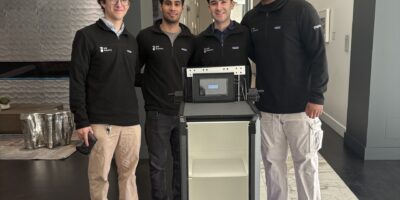Alison Lee
1B Nanotechnology
I’m not sure if I could have been any more excited about attending the Commerce and Engineering Environmental Conference (CEEC) at Queen’s. The acronym contains two of my favourite words: engineering and environmental, and one that I should learn more about: commerce. While I’m sad that I was the only delegate from Waterloo amidst a sea of suited-up commerce students and purple leather jackets, I’m still glad to represent UW (and possibly spread WEEF propaganda in strategic locations).
CEEC, pronounced “seek”, was held March 5th and 6th and is jointly organized each year by Queen’s Commerce and Applied Science students. It’s an opportunity for interdisciplinary discussion about how environmental concerns are changing the world’s economy, politics, and infrastructure. These issues require attention from incoming generations, aka us students, and from current industry leaders. CEEC is all about connecting these people and their ideas. Every year the conference features keynote speakers, workshops, and a business case study competition. This year’s theme was Exploring the Green Advantage: Challenges and Opportunities Arising in Green Business.
What does this have to do with engineering? More than you’d think! Workshops included environmental impact assessments, green marketing, global food systems, wind turbines, and more. Interestingly, most of the entrepreneurs running these workshops were engineers with no formal business backgrounds. They took an idea, like an innovative catalytic converter, tested it in different markets, and then developed a business around it. Of course, this requires some business know-how, but with a little ingenuity and ambition, it’s possible to pick up along the way.
This isn’t to say that business students are obsolete. Participating in the business case competition, I was glad to have commerce students on my team. We had to develop a case for an international wind turbine company, given the emerging market and technologies. If you thought there were a lot of acronyms in engineering, commerce is full of them too (CAGR, CFO, LEAN- sound familiar?). My team didn’t win the business competition, but I snuck the words “innovation” and “co-op” into my presentation, so I’m sure we came in second.
Knowing how to structure a company, analyze a market, or make a financial forecast isn’t something most engineers really think about. Similarly, most commerce students wouldn’t know how to explore new materials or innovative product designs. This is why business and engineering consulting firms make so much money! If we just partnered up more often, great ideas would run rampant. We can’t ignore the economists, politicians or psychologists either. Who better than an eccentric business professor to explain why a “meat eater in a Prius” is far worse than a “vegetarian in a Hummer”? Sure, these people may not understand the science of climate change modeling or wind turbines, but they offer a different perspective that perhaps resonates more with the public than wordy science.
The rest of the conference consisted of three keynote speakers. John Bennett of the Sierra Club gave a more radical activist’s take on environmental action, with tales of canoeing into a nuclear power plant and dodging whale harpoons in a raft. Ian Baines of Windstream Energy gave advice as a passionate engineer on taking risks in the business world. The conference closed with Jose Etchverry of York Univesity, who spoke about advanced renewable energy systems in Europe and some in Toronto.
The commerce side of CEEC meant that it was ten times more formal than any engineering event. Good thing I brought dress pants, because everyone was in full suits, and there were multiple wine and cheese networking events. Of course, there was a Steamwhistle-sponsored social too, and the Queen’s party school rumours were confirmed.
After speaking to CEEC’s external organizer, I think they really want to bring more external delegates next year and I hope Waterloo will have a more visible presence. I’ll certainly keep going back when I’m on winter study term. Conferences like this really help inspire action and emphasize the need for more networking between faculties. CEEC has been going on for 20 years now, and if I learned anything from this weekend, it’s that change needs to be bigger and faster. In the words of that eccentric business professor from Queen’s, “no one cares if the deck chairs on the Titanic are recyclable”. It’s up to us to take the initiative to hurry up and “CEEC” solutions.







Melissa Ha
As Speakers Coordinator of CEEC 2010, I can’t be more glad to hear such a positive feedback from a delegate. You just made my day! =) Thanks for your support.